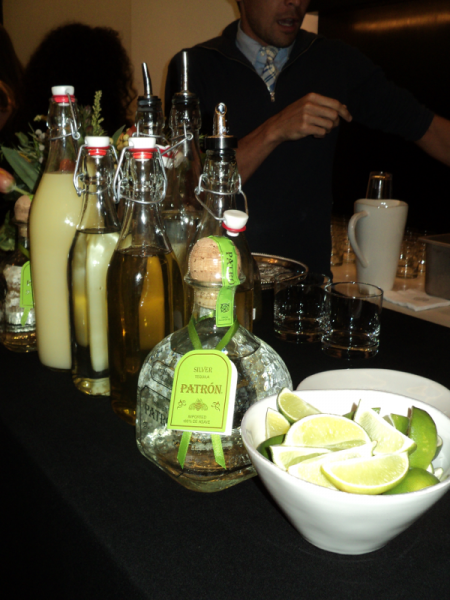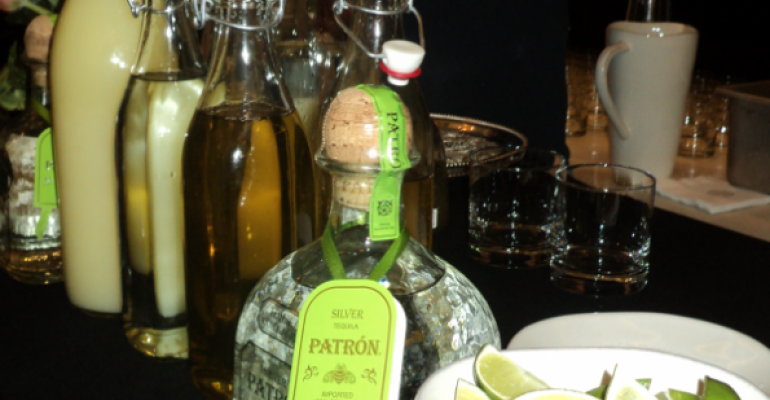
Chipotle Mexican Grill doesn’t launch new menu items very often. The fast-casual burrito giant tests things from time to time, like chorizo or some smaller items for kids, and at the moment it’s seeing if its new tofu offering has legs in California, but nothing has made it to a nationwide rollout since its salad, which was launched so long ago that I can’t find it on nrn.com, and at any rate it’s just a burrito minus the tortilla, plus lettuce and a vinaigrette.
Chipotle’s finally managing a new systemwide rollout this month, however, with a new Margarita at its more than 900 units that have liquor licenses.
Chipotle has had a Margarita for years, made from a mix, but the new one is made with lemon and lime juice squeezed daily, agave nectar, triple sec and either Patrón or Sauza tequila.
The company threw a party to celebrate the new drink at its test kitchen in New York City.
Chipotle doesn’t just have a test kitchen, it has an intimidatingly deep bench of big-name chefs working there, including Nate Appleman, who won the James Beard award for rising star chef of the year in 2009 and wowed diners on both coasts with his cooking at A16 in San Francisco and Pulino in New York City; Joel Holland, who cut his teeth at some of Wolfgang Puck’s restaurants, and then worked at Nobu in Las Vegas and ran his own fine dining restaurants in Jackshon Hole, Wyo., before joining the Chipotle team; and Kyle Connaughton, who was head chef of research & development at The Fat Duck in Bray, England — one of the great temples of avant-garde fine dining.
They prepared miniature ceviche tacos with American caviar; corn pudding with crab, ramps and adobo; compressed pineapple topped with pork picadillo, and other things you can’t get at Chipotle, while we all drank our fill of tasty Margaritas.
It’s not hard to make a good Margarita: equal amounts of tequila, triple sec and lime juice will do the trick (that’s chef Zarela Martinez’s recipe), provided the lime juice is freshly squeezed.
Chipotle’s is a little different, as they use both lemon and lime juice, and they add some organic agave nectar.
Chipotle communications director Chris Arnold was at the party. He said the Margaritas will be made to order in each of the restaurants, in special shakers marked with how high to fill them with each ingredient. As long as the staff adds the ingredients in the right order, it ought to be relatively full-proof, provided the juice quality is consistent (that’s going to be tricky) and they have some sort of standardized shaking protocol in place.
As my colleague Lisa Jennings reported, the Margaritas will cost between $6.50 and $8, depending on the location, although a less expensive version made with Sauza tequila will be available as well.
Chipotle has a long tradition of upgrading the quality of its product. Arnold told the partygoers that that was what the chefs in the test kitchen spent most of their time working on.
That approach was most famously successful when Chipotle upgraded its carnitas from commodity pork to “free range” pork, and also added a dollar to the sales price (and marketed the change heavily). The result: Chipotle actually sold more carnitas burritos than it had at the lower price.
Arnold wouldn’t commit to saying they hoped for the same thing with this upgraded Margarita.
Sales of beer and Margaritas currently make up between 1 percent and 2 percent of total sales at Chipotle, he said.
So there’s certainly an opportunity to grow. But that’s true everywhere in the fast casual segment, where no one has really managed to make alcohol a big part of the sales mix (although Smashburger seems to have had some success lately with its burger-and-beer pairing program).
Arnold said the new Margaritas were really an attempt to bring those drinks in line with the quality of their other food, rather than to boost sales.
That’s a plausible explanation, and a good way to avoid having to apologize in case sales don’t go up.
September 5, 2013: Several typographical erros in this entry were corrected.

